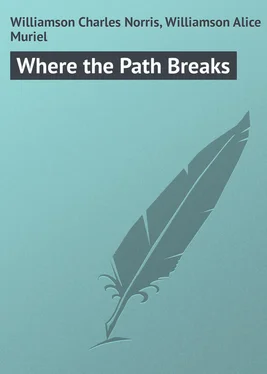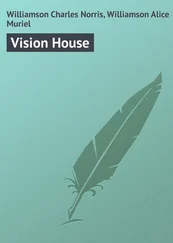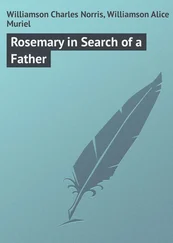Charles Williamson - Where the Path Breaks
Здесь есть возможность читать онлайн «Charles Williamson - Where the Path Breaks» — ознакомительный отрывок электронной книги совершенно бесплатно, а после прочтения отрывка купить полную версию. В некоторых случаях можно слушать аудио, скачать через торрент в формате fb2 и присутствует краткое содержание. Жанр: foreign_prose, на английском языке. Описание произведения, (предисловие) а так же отзывы посетителей доступны на портале библиотеки ЛибКат.
- Название:Where the Path Breaks
- Автор:
- Жанр:
- Год:неизвестен
- ISBN:нет данных
- Рейтинг книги:5 / 5. Голосов: 1
-
Избранное:Добавить в избранное
- Отзывы:
-
Ваша оценка:
- 100
- 1
- 2
- 3
- 4
- 5
Where the Path Breaks: краткое содержание, описание и аннотация
Предлагаем к чтению аннотацию, описание, краткое содержание или предисловие (зависит от того, что написал сам автор книги «Where the Path Breaks»). Если вы не нашли необходимую информацию о книге — напишите в комментариях, мы постараемся отыскать её.
Where the Path Breaks — читать онлайн ознакомительный отрывок
Ниже представлен текст книги, разбитый по страницам. Система сохранения места последней прочитанной страницы, позволяет с удобством читать онлайн бесплатно книгу «Where the Path Breaks», без необходимости каждый раз заново искать на чём Вы остановились. Поставьте закладку, и сможете в любой момент перейти на страницу, на которой закончили чтение.
Интервал:
Закладка:
Denin did not know whether to be relieved or disappointed. Certainly he was not surprised, for he had asked for a mirror that morning, and had studied his marred face during a long, grim moment. From temple to jaw on the left side it was scarred with a permanent red scar. A white seam where stitches had been, ran through the right eyebrow. A glancing bit of shrapnel had cleft his square chin precisely in the center, giving a queer effect as of a deep dimple which had not been there before August 18th; and his thick black hair was threaded with gray at both temples.
A chair was given to him, in which to sit by the newcomer’s bedside. Severne was very young and, it seemed to Denin in contrast with that new vision of himself, as beautiful as a girl. Warned that the other man had lost his memory, the wounded aviator was pityingly careful not to ask questions. He talked cheerfully about his own adventures, and said that he had been “at home” on leave only a week ago.
“At home!” Denin echoed. “What was it like – over there?”
“Awfully jolly,” said Severne. “Not that they don’t care, or aren’t thinking about us, every minute, night and day. But you know how our people are. They make the best of things; they have their own kind of humor – and we understand. Fact is, I – went over to get married. I suppose – er – you never knew the Lacy-Wilmots of Devonshire? They’re neighbors of ours. I married the second daughter, Evelyn. I – we had two days together.”
“You were lucky,” said Denin.
“Think so? Well, we didn’t look at it like that. I wrote to her this morning. Hope she’ll get the letter.”
“Some fellows had only an hour or two with their brides, I heard,” Denin said, almost apologetically.
“That’s true,” said Severne. “Jove! There are shoals of war brides, poor girls, and as brave as they make ’em, every one!”
“What about – the war widows?” Denin ventured, stumbling slightly over the words.
“They’re brave too, all right. But I expect there are some broken hearts. Not all, though, by any means. Damn it, no! Lady Denin, for instance. Did you ever hear of her? I mean, did you ever hear of John Denin? They had about an hour of being married before he went off with the first lot in August, poor chap.”
“What about Denin?”
“Oh, you didn’t know him, then? Why should you? I didn’t myself, but he belonged to one or two clubs with my brother Bob. I may have seen him myself. Awfully fine chap. Everybody liked him, though he was close as a clam – no talker. Came into a ripping place and piles of oof a few years ago. Not much on looks, though he was an A1 sportsman and athlete. Girls thought him a big catch. I’ve heard plenty say so. Well, he married an American girl, a beauty, the day he left for the front, and about a fortnight later she was a widow with everything he had, made over to her. That wasn’t much above eight months ago. But the day Evie and I were tied up, the first of last week, Lady Denin married her cousin, d’Arcy of the – th Gurkhas. Quick work – what? No heartbreak there!”
As there came no answer, Severne supposed that his visitor felt no interest in this bit of gossip apropos of war widows. He glanced up from his hard, flat pillow at the other man, and saw what he took for a far-away look on the scarred face. To change the subject to one more congenial, the aviator began to chat of things at the front; but almost instantly the English-speaking nurse intervened. The two invalids had talked long enough. Both must rest. They could see each other again next day.
Without any protest, and scarcely saying good-by, Denin dragged himself back to his own part of the ward. “‘Nobody home!’ The poor fellow looks as if he wasn’t all there yet.” Severne excused the seeming rudeness of the nameless one.
Denin had not had his full hour of freedom from bed, but he declared that he was tired and that his head ached, so he was allowed to lie down. He turned his face to the wall, and appeared to sleep, but never had he been more vividly awake.
His plan had fallen into ruin with one bewildering crash. The corner-stone had been torn out from the foundation. His duty – or what he had seen as his duty – was changed. After all, Barbara had not been disappointed in her cousin. She had found him her “knight and her hero” as of old. She had loved the man so passionately that she had given herself to him after only eight months of widowhood. If he had heard this thing of a woman other than Barbara, Denin would have been revolted. It could only have looked like an almost defiant admission that there was no love in the first marriage – nothing but interest. He could not, would not, however, think that Barbara’s act was a proof of hardness. Lying on his bed, with his face to the blank white wall, he began to make desperate excuses for the girl.
She had married him by special license at three days’ notice eight months ago, hurried into a decision by his love, and perhaps the glamour of war’s red light. Her mother, too, had given her no peace until she made up her mind. For the hundredth time he assured himself of that fact. And as for the well-nigh indecent haste of the second wedding; why, after all, was it so much worse than the first?
Her marriage with him, John Denin, had been a marriage only in name. She was left a girl, with no memories of wifehood. No doubt this new giving of herself had been another “war wedding.” Trevor d’Arcy in his picture looked like a man who would do his best to seize whatever he wanted. He had of course been going away, perhaps after being wounded and nursed by Barbara. It would be natural, very natural, for her to feel that she would be happier when d’Arcy was at the front, if they belonged to each other. Denin told himself savagely that it would be brutal to blame the girl. She had a right to love and joy, and she should have both, unspoiled. He would be damned sooner than snatch happiness from Barbara, and drag her through the dust of shame, a woman claimed as wife by two men.
“This decides things for me, then, forever and ever,” he thought, a strange quietness settling down upon him, like a cloud in which a man is lost on a mountain-top. “She’s free as light. John Denin died last August in France.”
CHAPTER IV
But the man in the German hospital did not die. He could not, unless he put an end to his own life, and to do that had always seemed to Denin an act of cowardice and weakness. He remembered reading as a boy, how Plato said that men were “prisoners of the gods” and had no right to run away from fate. For some reason those words had made a deep imprint upon his mind at the time, and the impression remained. His soul dwelt in his body as a prisoner of the gods, a prisoner on parole.
Life – mere physical life – rose again in his veins as the days went on, rose in a strong current, as the sap rises in trees when winter changes to spring. He was discharged from the hospital as cured, and interned in a concentration camp in Germany not far from the Dutch frontier. Though he had given his parole to the gods, he would not give it to the Germans. He meant to escape some day if he could. He limped heavily, and had not got back the full strength of his once shattered right hand, so there was no hope of returning to fight under a new name. Had there been a chance of that, he would have wished to join the French Foreign Legion, where a man can be of use as a soldier, while lost to the world. As it was, he made no definite plans, but set about earning money in order not to be penniless if the day ever came when he could snatch at freedom.
He had always had a marked talent for quick character-sketches and a bold kind of portraiture. He could catch a likeness in a moment. With charcoal he dashed off caricatures of his fellow prisoners, on the whitewashed wall of the room which he shared with several British soldiers. The striking cleverness of the sketcher was noticed by the man in charge who spoke to some one higher in authority; and officers came to gaze gravely at the curious works of art. Denin had rechristened himself by this time “John Sanbourne.” Sanbourne seemed to him an appropriate name for one without an aim in life, and as for “John,” without that standby he would have felt like a man who has thrown away his clothes. Sanbourne’s charcoal sketches, therefore, began to be talked about; and officers brought him paper and colored chalks, bargaining with him for a few German war notes, to take their portraits. By the end of May he had saved up two hundred marks, accumulated in this way, charging from five to twenty marks for a sketch, according to size and detailed magnificence of uniform.
Читать дальшеИнтервал:
Закладка:
Похожие книги на «Where the Path Breaks»
Представляем Вашему вниманию похожие книги на «Where the Path Breaks» списком для выбора. Мы отобрали схожую по названию и смыслу литературу в надежде предоставить читателям больше вариантов отыскать новые, интересные, ещё непрочитанные произведения.
Обсуждение, отзывы о книге «Where the Path Breaks» и просто собственные мнения читателей. Оставьте ваши комментарии, напишите, что Вы думаете о произведении, его смысле или главных героях. Укажите что конкретно понравилось, а что нет, и почему Вы так считаете.











